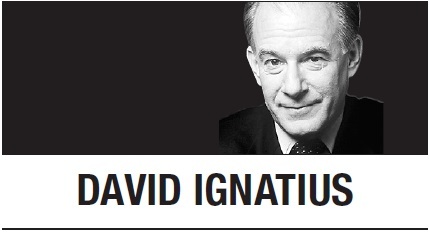[David Ignatius] Despite Trump’s rancor for the global system, the world economy is surging
By Korea HeraldPublished : Dec. 11, 2017 - 17:42
 A year ago, with the election of a US president who had fulminated against the international trade and financial systems, some analysts worried that the engine of global prosperity might soon be sputtering. But that’s not what happened.
A year ago, with the election of a US president who had fulminated against the international trade and financial systems, some analysts worried that the engine of global prosperity might soon be sputtering. But that’s not what happened.The global economy has surged forward this year, significantly outperforming expectations. As the International Monetary Fund wrote in its latest world economic outlook, published in October: “The current upswing reaches more broadly than any in a decade -- roughly 75 percent of the world economy ... is sharing in the acceleration.”
The IMF revised upward its forecast for the global economy, predicting 3.6 percent growth this year and 3.7 percent in 2018, powered by surging activity in Europe, Japan, China and America. The US will grow more slowly, at 2.2 percent this year and 2.3 percent in 2018, but that’s better than 2016’s anemic 1.5 percent.
Goldman Sachs’ forecasters are even more bullish. A November report, titled “As Good as It Gets,” offered this tonic for investors: “For the first time since 2010, the world economy is outperforming most predictions, and we expect this strength to continue.” Goldman projects 3.7 percent global growth this year and 4.0 in 2018.
So why, you might ask, does the US need a tax cut amid this global surge? Good question. Many economists warn that by ballooning the deficit and creating an artificial “sugar high” in the US economy, the tax-cut legislation passed by the House and Senate would add little to US long-term growth and could actually make it worse.
But let’s stick with the mystery that’s lurking in the upbeat numbers: Did this year’s good economic news happen because of Donald Trump’s presidency, or despite it?
Trump’s daily circus of anti-elitism during 2017 certainly looked like an attack on the global system: He scuttled the Trans-Pacific Partnership, threatened NAFTA and bad-mouthed trading partners Germany, Japan, South Korea and China. Yet global markets rolled forward, as if oblivious to the man in the White House who, figuratively speaking, was wielding a sledgehammer.
Trump boosters would argue that he reinforced global economic confidence, despite his political antics. And it’s certainly possible that financial markets were steadied, not disrupted, by the self-described billionaire who was ready to make deals to enhance the US position in the global economy.
The reality is that financial markets are driven by investor psychology -- the raw, instinctive confidence that it’s time to buy and invest. This was the central insight of economist John Maynard Keynes. In one of the most-quoted passages of his 1936 “General Theory,” Keynes argued that positive economic decisions “can only be taken as a result of animal spirits -- of a spontaneous urge to action rather than inaction.”
Animal spirits are certainly roaring overseas. China inspires confidence as it shifts to a slightly slower but more sustainable pace. Emerging economies, generally, are thriving: Goldman forecasts that India will grow 8 percent next year, 1.5 points faster than China, and that emerging markets as a group will grow at 5.6 percent.
A final reason for optimism is Europe’s recovery from its near-death experience of the past decade. The IMF attributes the revival to strong exports, solid domestic demand and “accommodative financial conditions amid diminished political risk and policy uncertainty.” In other words, good policy and good luck. A recent blog posting by economist Simon Johnson was headlined: “A European Economic Miracle?”
The weak spot is Britain, which appears to be paying a steep price for its post-Brexit retreat from Europe. The IMF said growth will fall this year to 1.7 percent (the IMF was predicting 2 percent back in April) and to 1.5 percent next year.
Reading all this good news, there’s a nagging sense that “we should not let a good recovery go to waste,” as IMF Managing Director Christine Lagarde put it in a recent speech at Harvard. “Repair the roof while the sun is shining,” she urged.
For the US, that means removing structural impediments to continued growth. US companies aren’t investing in new plants and equipment at the same levels as some Asian and European competitors, and few economists think that’s because of high taxes. One telling statistic: The US has been the worst at reducing inequality of all high-income countries, a recent Peterson Institute report noted. The new tax bill could make that problem worse.
Boosting US demand by increasing workers’ real wages would make this recovery as real and powerful at home as it seems to be abroad. If we’re really talking about making America great again, rebuilding middle-class incomes is where to start.
By David Ignatius
David Ignatius can be reached via Twitter: @IgnatiusPost. -- Ed.
(Washington Post Writers Group)
-
Articles by Korea Herald











![[Kim Seong-kon] Democracy and the future of South Korea](http://res.heraldm.com/phpwas/restmb_idxmake.php?idx=644&simg=/content/image/2024/04/16/20240416050802_0.jpg&u=)








![[Today’s K-pop] Zico drops snippet of collaboration with Jennie](http://res.heraldm.com/phpwas/restmb_idxmake.php?idx=642&simg=/content/image/2024/04/18/20240418050702_0.jpg&u=)